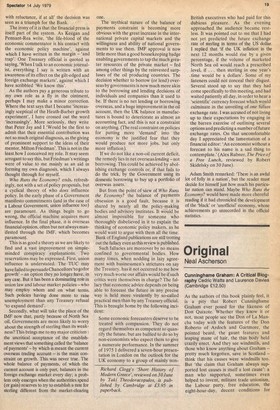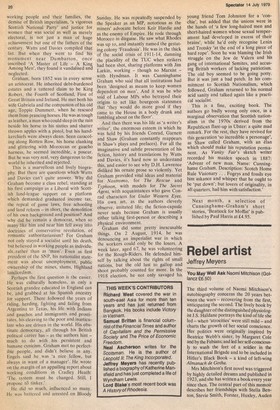Original
Neal Ascherson
Cunninghame Graham: A Critical Biography Cedric Watts and Laurence Davies (Cambridge £12.50) As the authors of this book plainly feel, it is a pity that Robert Cunninghame Graham ever posed for the likeness of Don Quixote. Whether they know it or not, most people see the Don of La Mancha today with the features of the Don Roberto of Ardoch and Gartmore, the pointed beard, the gaunt features and Leaping mane of hair, the thin body held crazily erect. And they see windmills, and those who know anything about Graham — pretty much forgotten, save in Scotland — think that his causes were windmills too. But 'the claim that Graham always supported lost causes is itself a lost cause': a man who supported, sometimes even helped to invent, militant trade unionism, the Labour party, free education, the eight-hour-day, decent conditions for working people and their families, the demise of British imperialism, 'a vigorous Scottish National Party' and justice for women that was social as well as merely electoral, is not just a man of huge achievement but one of the fathers of the century. Watts and Davies compiled that list. But when they went to find his monument near Dumbarton, once inscribed 'A Master of Life — A King Among Men', they found it vandalised and neglected.
Graham, born 1852 was in every sense an aristocrat. He inherited debt-burdened estates and a tattered claim to be King Robert, the Fourth of Scotland, First of Great Britain and Ireland. He met both his wife Gabriela and the companion of his old age, Toppie Dummett, when he rescued them from prancing horses. He was as tough as leather, a man who could sleep in the rain beside his horse in his sixties and shatter thrown apples with a pistol, but his handkerchiefs were always clean. Seen caracoling along Rotten Row, his horse clanking and glittering with Moroccan or gaucho harness, he seemed incredible, a poseur. But he was very real, very dangerous to the world he inherited and rejected.
This is a marvellous and lively biography. But there are questions which Watts and Davies can't quite answer. Why did Graham become a class rebel, standing at his first campaign as a Liberal with Scottish land-league support on a platform which demanded graduated income tax, the repeal of game laws, free schooling and land reform — in short, the demolition of his own background and position? And why did he remain a democrat, when so many like him and near him fell away into doctriries of conservative revolution, of romantic authoritarianism? For Graham not only stayed a socialist until his death, but believed in working people as individuals rather than as 'mass'. Even as first president of the SNP, his nationalist statement was about unemployment, public ownership of the mines, slums, Highland landlordism.
Perhaps the first question is the easier, He was culturally homeless, as only a Scottish grandee educated in England can be, and grabbed at his Spanish ancestry for support. There followed the years of riding, herding, fighting and failing from Argentina to Texas, his life with Indians and gauchos and immigrants and prosti tutes, his cleaving to the poor and inarticulate who are driven in the world. His obs tinate democracy, all through his British political career has — as the authors hint — much to do with his persistent and humane cynicism. Graham met no perfect ible people, and didn't believe in any. Engels said he was 'a nice fellow, but always in want of a manager'. He wrote on the margin of an appalling report about working conditions in Cradley Heath: 'The system must be changed. Still, I propose to tinker.'
He did so much, influenced so many. l le was battered and arrested on Bloody Sunday. He was repeatedly suspended by the Speaker as an MP, notorious as the miners' advocate before Keir Hardie and as the enemy of Empire. He rode through Morocco in disguise. He saw what Rhodes was up to, and instantly named the gestating colony 'Fraudesia'. He was in the thick of the social crisis of 1911-14, damning the placidity of the TUC when strikers had been shot, sharing platforms with Jim Larkin, working — though no Marxist — with Hyndman. It was Cunninghame Graham who said that all institutions had been 'designed as means to keep women dependent on men'. And it was he who said of Labour MPs who betrayed their origins to act like bourgeois statesmen that 'they would do more good if they came to the House in a body drunk and tumbling about on the floor'.
And then there was his life as 'a writer's writer', the enormous esteem in which Ire was held by his friends Conrad, Garnett and Shaw (Graham constantly reappears in Shaw's plays and prefaces). For all the imaginative and subtle presentation of his fiction, history and translations by Watts and Davies, it's hard now to understand this, and easier to see why D.H. Lawrence disliked his ornate prose so violently. Yet Graham provided vital ideas and material for Nostromo, for The Rescue and Typhoon, with models for The Secret Agent, with acquaintances who gave Conrad characters for Under Western Eyes. His own art, as the authors cleverly observe, imitated life; the fiction-capsule never seals because Graham is usually either talking first-person or describing a physical environment. Graham did some pretty inexcusable things. On 2 August, 1914, he was denouncing an imperialist war in which the workers could only be the losers. A week later, aged 67, he was volunteering for the Rough-Riders. He defended himself by talking about the rights of small nations, but the old lust to gallop and shoot probably counted for more. In the 1918 election, he not only savaged his young friend Tom Johnston for a 'conchie', but added that the unions were in the hands of 'a few long-haired men and short-haired women whose sexual temperament had developed in excess of their brains', while he'd only recognise Lenin and Trotsky 'at the end of a long piece of hard rope'. Soon he was blaming the Irish struggle on the Jew de Valera and his gang of international Semites, and accusing British workers of lacking patriotism. The old boy seemed to be going potty. But it was just a bad patch. In his commitment to Scottish Nationalism, which followed, Graham returned to his normal acid sanity and talked again like a practical socialist.
This is a fine, exciting book. The authors go badly wrong only once, in a marginal observation that Scottish nationalism in the 1970s derived from the Republican flare-up in Ulster: a quite mad remark. For the rest, they have revived for this generation `so incredible a personage', as Shaw called Graham, with an élan which should make his reputation permanent, As Vanity Fair's sketch writer recorded his maiden speech in 1887: 'Advent of new man. Name: Cunninghame Graham. Description: Scotch Home Rule Visionary ... Fogeys and fossils eye him askance and whisper that he ought to be 'put down'; but lovers of originality, in all quarters, hail him with satisfaction.'
Next month, a selection of Cunninghame-Graham's short stories, 'Beattock for Moffat' is published by Paul Harris at £4.95.
THIS WEEK'S CONTRIBUTORS Richard West covered the war in south-east Asia for more than ten years and has just returned from Bangkok. His books include Victory in Vietnam.
Samuel Britten is financial columnist of the Financial Times and author of Capitalism and the Permissive Society and The Price of Economic Freedom.
Neal Ascherson writes for the Scotsman. He is the author of Leopold It The King incorporated. Jeffrey Meyers has recently published a biography of Katherine Mansfield and has Just completed a life of Wyndham Lewis. Lord Blake's most recent book was A History of Rhodesia.



































 Previous page
Previous page